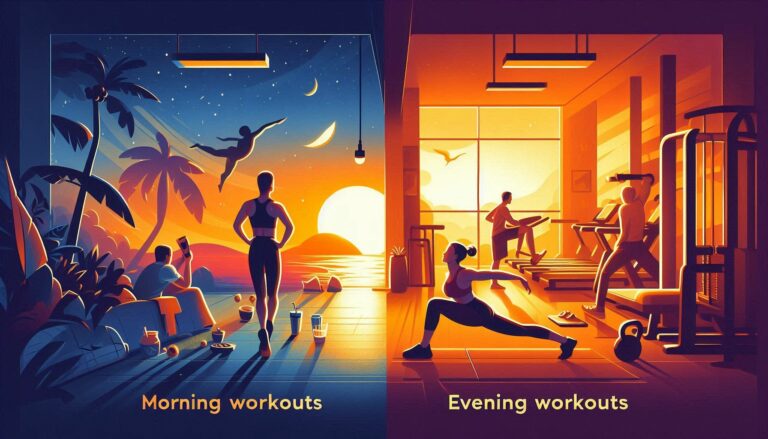Morning vs. Evening Workouts: Finding Your Optimal Exercise Time

Choosing the best time to work out can be tricky. Some people swear by morning workouts, while others find evening exercise more effective. The time you choose to work out can affect your energy levels, performance, and even your mood. In this article, we’ll explore the pros and cons of both morning and evening workouts to help you find the best time for your fitness routine.
Key Takeaways
- Morning workouts can boost your metabolism and mood, but may lead to fatigue and disrupted sleep.
- Evening workouts can improve strength and flexibility but might interfere with winding down before bed.
- Your personal schedule and lifestyle play a big role in choosing the best time to work out.
- The body’s natural rhythm can affect workout performance and energy levels.
- Science shows that workout timing can impact metabolism, muscle performance, and sleep quality.

Benefits of Morning Workouts
Morning workouts offer several advantages that can make them an excellent choice for many people. Let’s explore some of these benefits to help you decide if it’s the right fit for you.
Increased Metabolism
Starting your day with exercise can boost your metabolism. This means your body will burn more calories throughout the day, even when you’re not working out. This can be especially helpful if you’re trying to lose weight or maintain a healthy weight.
Enhanced Mood and Energy Levels
Morning workouts can set a positive tone for the rest of your day. The release of endorphins during exercise can make you feel happier and more energetic. This can help you tackle your daily tasks with a better attitude and more vigor.
Better Consistency and Routine Formation
Working out in the morning can help you establish a consistent exercise routine. Since mornings are usually less busy than other times of the day, it’s easier to stick to your workout schedule. This can lead to better long-term fitness results and make exercise a regular part of your life.

Morning workouts eliminate the worry about finding time for exercise later in the day. This sense of freedom and flexibility can alleviate stress and help establish a consistent daily routine.
Drawbacks of Morning Workouts
Possible Fatigue and Lack of Motivation
Waking up early for a workout can be tough. You might feel groggy if your alarm wakes you from deep sleep. This can make it hard to motivate and give your best effort during exercise.
Limited Warm-Up Time
In the morning, your body temperature is lower, making your muscles feel stiff. It’s crucial to take extra time to warm up properly. However, with a busy schedule, you might not have enough time to do this, increasing the risk of injury.
Potential for Disrupted Sleep Patterns
Morning workouts can mess with your sleep. If you have to wake up much earlier than usual, it can disrupt your natural sleep cycle. This might lead to feeling tired throughout the day.
While morning workouts have their benefits, it’s important to consider these drawbacks before deciding if they fit your schedule.
Benefits of Evening Workouts
Improved Strength and Performance
When you exercise in the evening, your body is at its peak performance. Your muscles are warmer and more flexible, which can help you lift heavier weights and perform better. This means your workout can be more effective and efficient.
Flexibility in Scheduling
Evening workouts offer more flexibility. After a long day, you can unwind and prioritize your health. This can be a great way to release tension and stress from the day’s events. Plus, it might be easier to fit into your schedule compared to morning workouts.
Enhanced Muscle Recovery
Working out in the evening can also help with muscle recovery. The release of endorphins during exercise can promote relaxation and contribute to a restful night’s sleep. This can help your muscles recover better and faster.
Evening workouts can be a great way to de-stress and improve your overall health. They offer unique benefits that can make your exercise routine more effective and enjoyable.
Drawbacks of Evening Workouts
Potential for Decreased Motivation
After a long day, feeling tired and less motivated to exercise is common. This can make it hard to stick to a workout routine in the evening. Staying consistent with evening workouts can be a challenge if you often feel drained after work or school.
Difficulty Winding Down Before Bedtime
Exercising too close to bedtime can make it hard to fall asleep. Your body needs time to cool down and relax after a workout. If you find it hard to sleep after evening exercise, try to finish your workout at least a few hours before bed.
Possible Conflicts with Social or Work Commitments
Evening workouts can clash with other activities. You might have social plans or work tasks that make it tough to fit in exercise. Balancing these commitments with your fitness goals can be tricky. Planning and setting a regular schedule can help you stay on track.
Factors to Consider When Choosing a Workout Time
Personal Schedule and Lifestyle
The best time to exercise is when it fits into your daily routine. Whether you have a busy work schedule or school commitments, find a time that works for you. Consistency is key to making exercise a habit.
Fitness Goals
Your workout time can depend on what you want to achieve. If you’re aiming to build muscle, evening workouts might be better. For weight loss, morning sessions could be more effective.
Body’s Natural Rhythm
Everyone has a different internal clock. Some people feel more energetic in the morning, while others peak in the evening. Listen to your body to find your optimal workout time.

Experiment with different times of the day to see when you feel the most energetic and motivated. This can help you find the best time of day to workout and stick to it.
The Science Behind Workout Timing
Impact on Metabolism
Exercise timing can influence your metabolism. Morning workouts may boost your metabolism early in the day, helping you burn more calories. On the other hand, evening workouts can also be effective, as your body might be more prepared for intense activity later in the day.
Effect on Muscle Performance
Your body’s natural rhythm (chronotype) plays a role in muscle performance. Some people find they perform better in the evening when their muscles are warmer and more flexible. One study found that compared to early morning workouts, afternoon sessions enabled them to play better and even sleep longer.
Influence on Sleep Quality
Working out at different times can affect your sleep. Morning exercise can help you sleep better at night by regulating your sleep-wake cycle. However, intense evening workouts might make it harder to wind down before bed.
Finding the best time to exercise depends on your personal schedule and how your body responds. Experiment with different times to see what works best for you.

Read More from Blog
Conclusion
Choosing between morning and evening workouts ultimately depends on your personal preferences, schedule, and fitness goals. Morning workouts can jumpstart your day with energy and consistency, while evening workouts might offer better performance and flexibility. Both have their unique benefits and drawbacks, so it’s important to consider what works best for you. Remember, the best workout time is the one you can stick to regularly. Stay active and find a routine that fits your lifestyle.
Frequently Asked Questions
Is it better to work out in the morning or evening?
Both morning and evening workouts have their benefits. Morning workouts can boost your metabolism and help you stay consistent, while evening workouts might improve your strength and performance. The best time depends on your schedule and how your body feels.
Can working out at night affect my sleep?
Yes, for some people, exercising too close to bedtime can make it harder to fall asleep. It’s important to find a balance and see what works best for you. If you find it hard to wind down, try to finish your workout at least a couple of hours before bed.
What are the advantages of morning workouts?
Morning workouts can help increase your metabolism, improve your mood and energy levels for the day, and make it easier to stick to a routine. Plus, you might face fewer distractions early in the morning.
Are there any drawbacks to working out in the evening?
Evening workouts can sometimes lead to decreased motivation after a long day, and it might be harder to wind down before bed. Additionally, evening workouts can conflict with social or work commitments.
How do I choose the best time to work out?
Consider your schedule, fitness goals, and how your body feels at different times of the day. Some people have more energy in the morning, while others perform better in the evening. It’s all about finding what works best for you.
Does working out in the morning help with weight loss?
Working out in the morning can help with weight loss by boosting your metabolism and helping you burn more calories throughout the day. However, the most important factor is consistency, so choose a time when you can stick to your routine.












